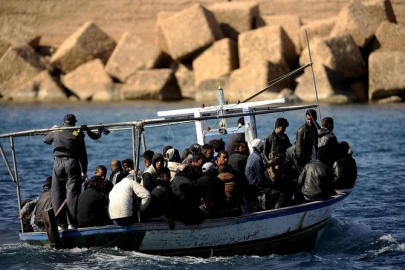At least 22 people have died and several others are still missing after two migrant boats capsized near the Italian island of Lampedusa in the Mediterranean Sea.
The boats had left Zawiya, Libya, on Tuesday evening carrying migrants hoping to reach Europe. But tragedy struck when one boat began to sink, and panicked passengers reportedly jumped onto the second boat, overloading it. Both boats eventually overturned.
The Italian Red Cross, which manages the reception center in Lampedusa, confirmed the death toll and said 60 survivors were rescued 56 men and 4 women. The total number of passengers remains unknown, but Italian media estimate there were about 97 people on board both vessels.
Italian news agency ANSA reported that the first bodies taken to the Lampedusa mortuary included a newborn baby, three children, two women, and two men. Survivors told authorities how the disaster unfolded after the boats became overcrowded and water began pouring in.
“Deep anguish for yet another shipwreck off the coast of Lampedusa,” wrote Filippo Ungaro, spokesperson for the UN Refugee Agency (UNHCR), on social media.
The tragedy happened 14 nautical miles from Lampedusa, according to Italy’s Interior Minister Matteo Piantedosi.
A surveillance plane from Italy’s financial police was the first to spot people in the water and alerted rescue teams.
Authorities fear the number of missing people could rise, as many may have drowned before help arrived.
The central Mediterranean is one of the most dangerous migration routes in the world. Migrants many fleeing conflict, poverty, or persecution often attempt the journey in overcrowded and unsafe boats, especially during the calmer summer seas.
So far in 2025, at least 675 people have died attempting to cross this route, according to UNHCR. As of Wednesday, 38,263 migrants have arrived on Italian shores this year.
Italy’s hardline government, led by Prime Minister Giorgia Meloni, has made controlling migration a key priority. The government has signed agreements with North African countries, offering financial support and training in exchange for stopping migrants from departing.
Interior Minister Piantedosi called the latest disaster a painful reminder of the need to stop illegal sea journeys and combat human smuggling.
“We must prevent these dangerous trips and fight the ruthless trafficking networks,” he posted on social media.
Humanitarian groups continue to urge European countries to improve rescue operations, offer safer migration pathways, and address the root causes of migration — including war, poverty, and climate change.
As the Mediterranean claims more lives, survivors and families of the missing are left grieving yet another preventable tragedy.



